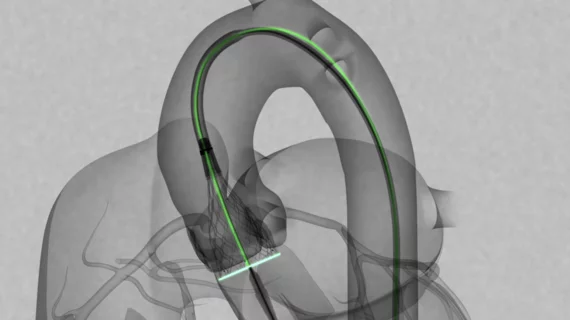Medtronic’s newest self-expanding TAVR system linked to improved performance
Medtronic’s Evolut FX transcatheter aortic valve replacement (TAVR) system is associated with improved commissure alignment compared to previous Evolut TAVR offerings, according to a late-breaking presentation at the PCR London Valves 2022 conference.
The self-expanding, supra-annular Evolut FX TAVR device gained FDA approval back in August 2021 as a treatment option for symptomatic severe aortic stenosis. It is indicated for both high- and low-risk patients. Its commercial launch was announced in September 2022.
The data presented at PCR London Valves 2022 focused on 168 patients from six U.S. facilities. Outcomes were compared to an additional 378 patients treated with the Evolut PRO+ TAVR system at a single U.S. facility.
Overall, the Evolut FX system was associated with a high rate of commissural alignment (95.8%) and 30-day mortality and stroke rates of 1.2% and 1.8%, respectively.
“In this early experience, the Evolut FX system provided several enhancements over the PRO+ system not only because of its easier trackability, but more importantly achieving a more symmetric deployment on release and improved commissural alignment with reduced coronary overlap,” principal investigator Gilbert Tang, MD, MSc, surgical director of the structural heart program at Mount Sinai Health System and a professor at the Icahn School of Medicine at Mount Sinai, said in a prepared statement. “These features resulting in better procedural predictability and consistency in TAVR may be critical in low-risk patients and broaden the adoption of TAVR to a wider population. By looking closely at data across multiple centers, we’re able to demonstrate the procedural improvements of the FX system over its predecessors.”
“The preliminary real-world results from the Evolut FX system deliver on our goal to further enhance our TAVR platform to improve physician experience and optimize outcomes for patients,” added Jeffrey Popma, MD, vice president and chief medical officer of Medtronic’s structural heart and aortic business.
More information about the PCR London Valves 2022 conference is available here. Previous coverage can be read here.

